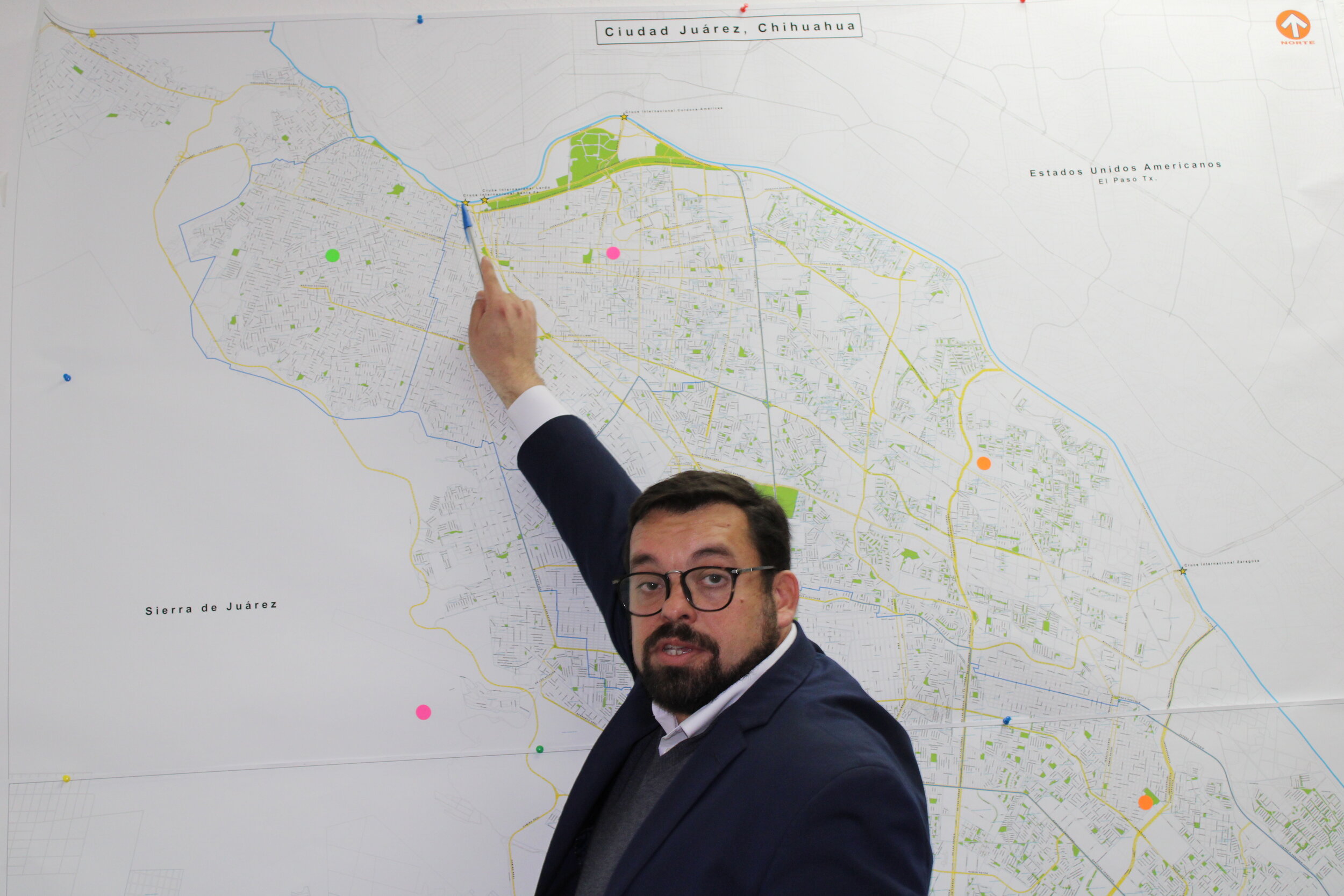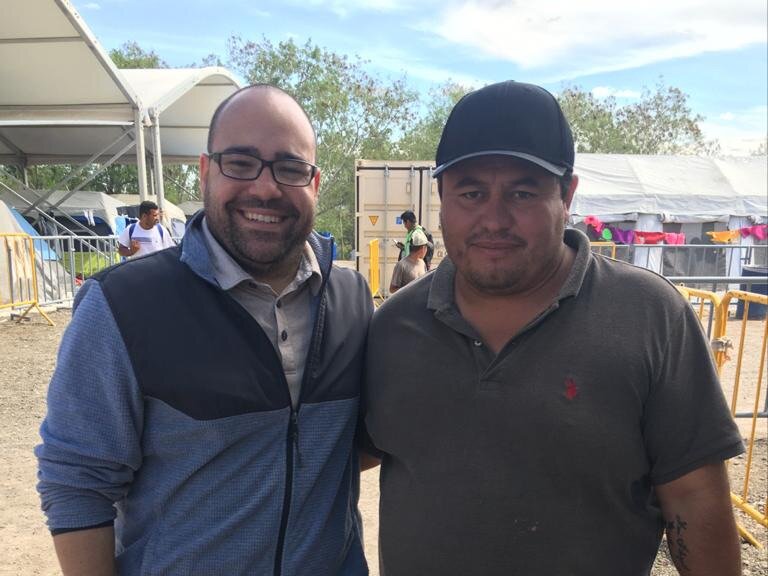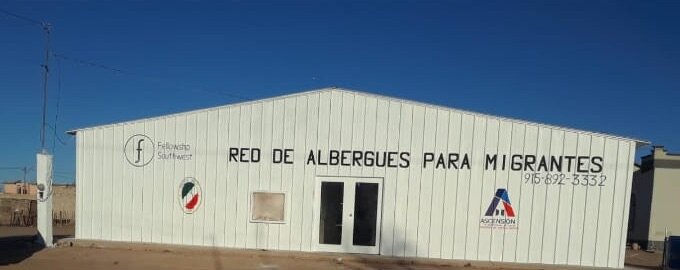Stories to inspire, challenge and educate.
To find stories related to FSW’s four priorities, click on the category below.
Churches are crucial to protecting immigrants, Mexican leader says
People of faith are helping provide a buffer of protection between the coronavirus and thousands of immigrants along the United States border, a government leader in north central Mexico reported.
"The best (protective) efforts have been working side-by-side with organizations of faith, specifically the evangelical churches," Enrique Valenzuela said of the government’s efforts to contain the virus and protect the population. "The merit goes out to the churches. Some of them stopped using their temples and converted them … to help social distancing during this pandemic."
González’s care packages cheer Tijuana refugees
Care packages brightened the day for 90 refugees living at Albergue Juventud 2000, a youth shelter in Tijuana, Mexico, early this week. Pastor Juvenal González handed out the little boxes containing high-demand hygiene products that are hard to get in Mexican immigrant shelters.
Pandemic leads to tightened border, attempted deportations
Two developments—both propelled by increasing concern over the COVID-19 pandemic—have begun to affect Fellowship Southwest’s Immigrant Relief Ministry along the breadth of the U.S.-Mexico border.
First, the border now is closed to all but selected travelers. This situation developed in stages. In mid-March, the U.S. and Mexican governments instituted a partial border closing. Initially, pastors and other relief workers feared they would not be able to cross the border to minister to refugee asylum seekers living in tent camps and shelters in northern Mexico. Officials maintained uneven enforcement, allowing pastors, chaplains and other aid workers to cross in most locations.
Keeping our eyes on the constant in a sea of turmoil
My buddy Brent accompanied me through one of the longest days of my life. “Wanna go deep-sea fishing?” he had asked. Adrift of sanity, I had answered affirmatively.
We awoke way before dawn—on vacation; that should’ve been a clue—and trekked toward the harbor. A flashing “Hot Donuts!” sign lured us off the road for a few minutes. Fortified with coffee and buzzing with sugar, we arrived at the dock on time.
Before you could say, “Bait your hook,” we paid real money to join about 120 strangers on a vessel that should’ve held half that many. The first mate lectured about all kinds of safety procedures I don’t recall. But he said one thing I’ll never forget: “If you have to throw up, throw up outside the boat.”
As the pandemic and weekend approach, thoughts about asylum seekers
One of our collaborators called from Matamoros, Mexico. Prompted by COVID-19, desperation is starting to sink into refugee camps on the border. Some immigrants are leaving the camps, others are moving to shelters, but not many are taking buses to Mexico's southern border to return to their home countries. Worst, some are thinking about sending their children to enter the United States unaccompanied.
Mission Oak Cliff: Lifeline for immigrants in Dallas
Undocumented immigrants are flooding food pantries and benevolence centers during the COVID-19 pandemic. They are desperate, afraid, distrustful of everyone and lonely. They feel they have no hope for them. They are one of the most vulnerable people in America right now.
That's Kevin Pranoto's experience in Dallas.
Pranoto is executive director of Mission Oak Cliff, a community ministry of Cliff Temple Baptist Church that provides food and clothes to the homeless. Over the past two weeks, he has witnessed a surge in the number of people seeking assistance, the majority of them immigrants.
Despite viral pandemic, pastors persist in ministry to refugees
Compassion and concern, faith and fear, respect and resolve crackled across the country as pastors who comprise Fellowship Southwest’s ministry to asylum seekers talked on the phone March 25. They spent almost two hours telling each other about their work with refugees on the U.S.-Mexico border, as well as their concerns for those immigrants, living in the shadow of the coronavirus.
Fellowship Southwest partner Lorenzo Ortiz stays behind closed border
Lorenzo Ortiz, a Texas pastor who operates three immigrant shelters in Nuevo Laredo, Mexico, stayed behind when the U.S. and Mexican governments closed the border to all “nonessential” travel at midnight Saturday, March 21.
Mutual concern about the transmission of COVID-19 led U.S. and Mexican policymakers to shut down border crossings partially, from the Gulf of Mexico to the Pacific Ocean. Officials of both governments stressed the travel restrictions would not impede lawful trade and commerce, but crossings would be limited in order to curtail transmission of the coronavirus.
God demands Christians protect the foreigners
Caring for the stranger is an essential part of Christian ethics.
In fact, Job—the most righteous person of his time—considered welcoming the stranger crucial to his integrity. “But no stranger had to spend the night in the street, for my door was always open to the traveler,” he said (Job 31:32). Jesus took the same position when he said, "For I was hungry and you gave me food, I was thirsty and you gave me drink, I was a stranger and you welcomed me" (Matthew 25:35).
We can't distance ourselves from the experience of being a foreigner, since we are foreigners on this earth. The common heart of love and hospitality we share with our Lord should guide us to welcome our neighbor. We should see Christ in the stranger. That is the summary of Matthew 25:35. We should see ourselves in the stranger. That is the main message of Philippians 2:3-5.
FSW & COVID-19
God is our refuge and strength,
an ever-present help in trouble.
Therefore, we will not fear, though the earth give way,
and the mountains fall into the heart of the sea,
though its waters roar and foam,
and the mountains quake with their surging.
There is a river whose streams make glad the city of God,
the holy place where the Most High dwells.
God is within her, she will not fall;
God will help her at break of day.
Nations are in uproar, kingdoms fall;
he lifts his voice, the earth melts.
The Lord Almighty is with us;
the God of Jacob is our fortress.
Psalm 46:1-7
Matamoros nonprofit leader “always available” to asylum seekers
How do you contain passion? How can you decide to stop doing what you love to avoid risking your health and life? How do you stop helping others when that is what you love and what your faith pushes you to do?
Do you judge yourself if you put yourself in danger? Do you judge yourself if you protect yourself?
Capernaum embodies the gospel in Matamoros
Iglesia Bautista Capernaum delivers bread and the Bread of Life to asylum seekers in the campgrounds of Matamoros.
At least two days a week, the small congregation brings lunch to immigrants waiting out the asylum process in tent villages amassed just south of the U.S.-Mexico border.
But Pastor Rogelio Pérez is sure to feed their souls as well as their stomachs. Each visit to the campgrounds includes a worship service, in which Pérez invites the refugees to accept ultimate asylum in the love and grace of Jesus.
Meet Carlos Luna—Immigrant ministering among immigrants
It was a warm Thursday morning. Pastor Rogelio Pérez and I just crossed the United States-Mexico border accompanied by three brothers and sisters in Christ. We were carrying food, clothes and hygiene products. Our objective was clear—distribute these supplies to immigrants waiting in Mexico to enter the United States. Almost immediately, a man recognized Pastor Pérez from the multitude. He hugged the pastor and joined the group on our mission to help the needy.
He stood out from the rest of the refugees. He was different. Others were coming to see what they could get from Rogelio. Who can judge them? They are totally dependent on our giveaways for survival. Still, this man wasn't thinking about himself. He was thinking about those around him who needed more help.
Is it really a dream for DACA recipients?
Imagine your parents decided to immigrate to another country when you were a kid. They immigrated to protect you. It was a choice made out of love. The circumstances in your country of origin were so desperate your parents decided it wasn't unreasonable to risk the travel to come to the United States. They didn't inquire of your willingness to relocate. You were just brought to the United States.
Eventually, your parents relocated. You started attending school in the United States. You learned English. You made a lot of friends. You grew up with them. You learned the Pledge of Allegiance. You grew up in a community with shared values and customs that you adopted. You never returned to your country of origin.
Wherever the refugees are, that’s where we’ll be
An intriguing and disconcerting message popped up on my telephone screen late last week.
“I just got out from the meeting in Juarez … talking about the MPP changes,” wrote Rosalio Sosa, pastor of Iglesia Bautista Tierra de Oro in El Paso and leader of Fellowship Southwest’s efforts to minister to asylum seekers clustered across the Rio Grande in Juarez and in other parts of the state of Chihuahua.
Immigration attorney Elket Rodríguez to work on the border
Cooperative Baptist Fellowship Advocacy, CBF Global Missions and Fellowship Southwest are collaborating to place Elket Rodríguez, an attorney with extensive experience in immigration law, on their team on the U.S.-Mexico border.
Rodríguez, a native of Puerto Rico who lives and practices law in Harlingen, Texas, will become CBF’s immigrant and refugee specialist Monday, March 2.
You provided 2,250 meals in Nuevo Laredo
Thanks to your generosity, Fellowship Southwest provided more than 500 meals per week—2,250 breakfasts, lunches and dinners—to asylum seekers in Nuevo Laredo the past month.
Pastor Lorenzo Ortiz operates three refugee shelters in the Mexican city, just across the Rio Grande from his home in Laredo. Most of the immigrants come from Central America, but some are natives of Cuba, South America and elsewhere.
Partners open shelter near desert border crossing
Joy and gladness radiated from the desert about 100 miles west of Juarez, Mexico, early this week.
A shelter for refugees opened in Palomas, Chihuahua—thanks to a coalition that includes the village of Palomas, the state of Chihuahua, Red de Albergues Migrantes (the Migrant Shelter Network), regional nonprofits and Fellowship Southwest.
Although Palomas is isolated and surrounded by hostile terrain, asylum seekers still flow through. They strive for passage into the United States at the border crossing on the northern edge of town.
Christmas miracle: Construction moves ahead for immigrant respite center
Construction of an immigrant respite center at Iglesia Bautista West Brownsville will begin soon, thanks to a Christmas miracle of generosity.
IB West Brownsville ministers to refugees who pass through Matamoros, Mexico, as they seek asylum in the United States.
The U.S. immigration policy requires asylum seekers to “wait in place” in Mexico. So, they live in a tent city in Matamoros—without running water, heat in the winter and air conditioning in the summer—as they eke their way through the asylum system. They fill out applications and participate in multiple hearings with U.S. officials in northern Mexico. The process takes months. Then, only a tiny fraction eventually enter the United States, where they live with sponsors until they attend their final hearing.
We took a trip to Juarez and met all these lovely people on the border
The location changed, but the wonder and heartbreak remained the same this week, when Fellowship Southwest’s Immigrant Relief Ministry sponsored a tour of shelters for asylum seekers in and around Juarez, Mexico, across the Rio Grande from El Paso.
























